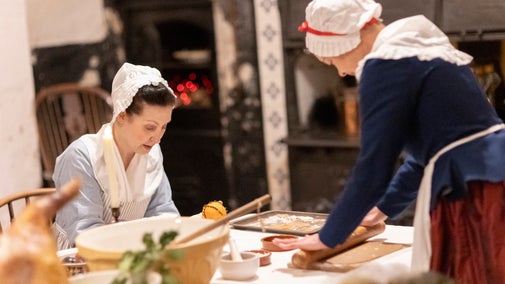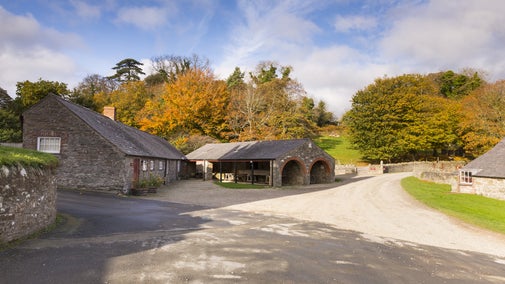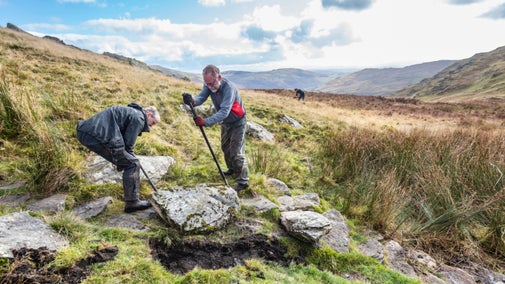
Donate
Everyone needs nature, now more than ever. Donate today and you could help people and nature to thrive at the places we care for.

Learn about some of the work we carry out throughout the year, from cleaning chandeliers to tending to the cattle that help us with conservation grazing. Find out what it takes to preserve the Castle Ward mansion and estate for generations to come.
Excerpts taken from a previously published article courtesy of David Young / PA Media.
Then Collections and House Manager, Neil Watt lives in an apartment in the Castle Ward mansion as part of his role. During the pandemic lockdowns in 2020 he and his partner, Kris Reid (current Collections and House Manager), used the time when there were no visitors to make repairs and restore many of the objects in the mansion’s collection.
First they installed a new dehumidifying system to address a centuries-old damp problem. Then they set about cleaning and cataloguing the house’s collection of 2,000 books, most dating from the 18th century.
Castle Ward also has one of the finest sets of cooking pots and pans on the island of Ireland, but over the centuries it had become blackened and tarnished. Neil and Kris took on the job of polishing the 100 pieces one by one. They did the same with many other fixtures and fittings, including all the brass door handles.
The good weather in the early summer enabled them to clean the antique window blinds and beat down the luxury carpets and rugs. There was also the delicate job of cleaning the Victorian crystal chandeliers. Neil said in any other year the jobs would not have been doable:
– Neil Watt, former Collections and House Manager at Castle Ward

Castle Ward is the first National Trust property in Northern Ireland to deliver a field-to-fork initiative. Dexter beef raised sustainably on the estate now features seasonally on the menu in the tea-room.
Tenant farmer Alan Laughlin and rangers at Castle Ward have been working together to use conservation grazing techniques to farm the land on the estate in a more nature-friendly way. In recent years Alan’s rare-breed Dexter cattle have been transforming Tullyratty (the grasslands on the estate and a designated ASSI).
A small, sturdy breed, this herd of Dexter cattle was born and raised at Castle Ward and the animals are pasture-fed only. This means they can support the National Trust with conservation grazing, contributing to the species diversity of the land.
As well as normal grassland, the cattle graze the woody grass, allowing a varied range of native wild flowers to spring up. This in turn supports local pollinators. The resulting species diversity benefits both the rich diet of the cattle, and supports the National Trust’s aim of restoring a healthy, beautiful environment.
– Alan Laughlin, Farmer on the Castle Ward estate
When you visit the tea-room at Castle Ward, why not taste the produce for yourself? A variety of dishes using Castle Ward Dexter beef will be available seasonally, creating a complete farm-to-fork experience.

Everyone needs nature, now more than ever. Donate today and you could help people and nature to thrive at the places we care for.
Unique and unusual, this eccentric 18th-century house is famed for having been built with two completely different architectural styles, both inside and out. Find out why.

Discover the stories of some of the most notable people who have lived at Castle Ward over the centuries, from one of the mansion’s creators to a celebrated war correspondent.

Wander through the Georgian rooms of this eccentric mansion, famed for its contrasting architecture and interiors, and explore the servants' world below stairs. The house is open daily except Tuesdays, from 11am to 4pm for free-flow exploration. Last entry is at 3.45pm.

Explore miles of trails, soak up coastal views and stroll through atmospheric woodland scenes. Tune into the seasons and see where Game of Thrones was filmed.

Together, we're securing our future with action on climate and the environment. Learn more about how we're responding to the changing climate at places in our care.

We believe that nature, beauty and history are for everyone. That’s why we’re supporting wildlife, protecting historic sites and more. Find out about our work.

The newly-acquired portrait of Lady Ann Bligh—the only known image of her—sheds light on her overlooked role in shaping Castle Ward in the 1760s and enriches the site’s understanding of women’s history. After expert conservation work, the painting is now on display, reuniting the house with one of its most significant yet marginalised figures.
Read about our strategy, which focuses on restoring nature, ending unequal access and inspiring more people.
